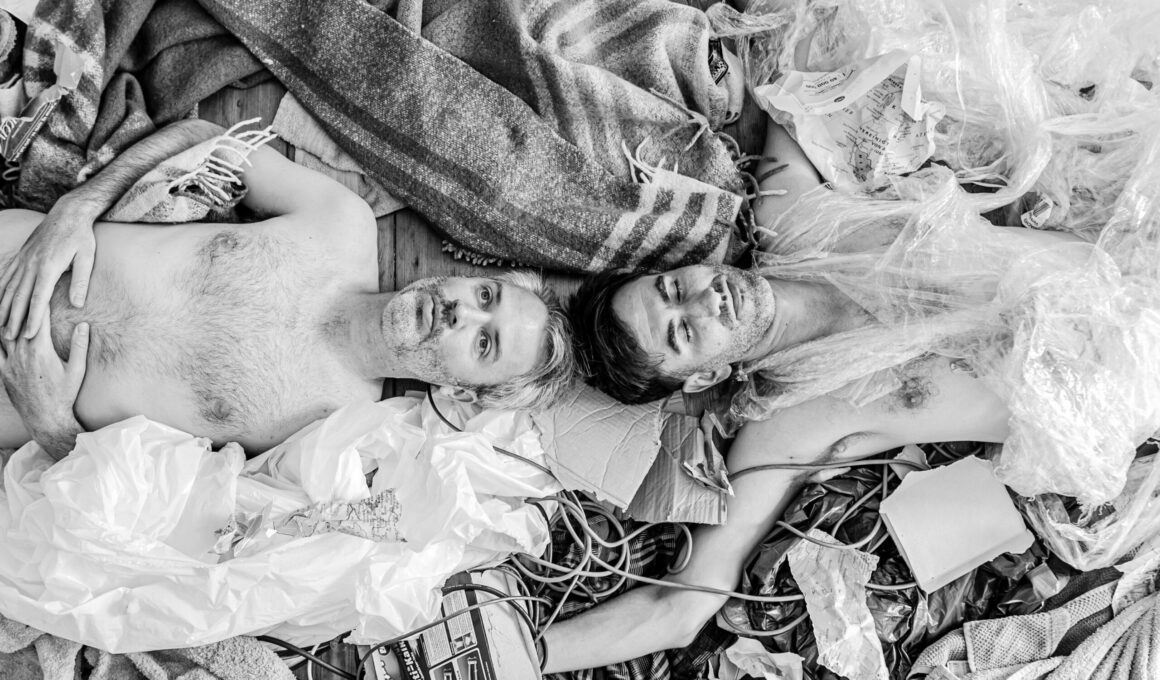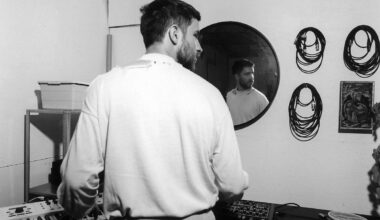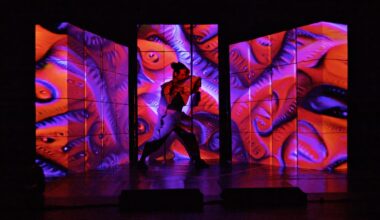Budokan Boys is the weird, acerbic pop project of multi-instrumentalist Jeff T Byrd and vocalist Michael Jeffrey Lee — two Americans living in Berlin. ‘So Broken Up About You Dying’, their new album, is out now on Ever/Never. ‘The Magic Mountain’ is the eerie, icy summit of Budokan Boys’ the new album, with a video by Tomek Popakul which we are very happy to present along with an interview from the boys.
A few years ago, in New Orleans, Louisiana, Jeff T Byrd and Michael Lee were sitting around in Lee’s room, trying to figure out what to do. Their jobs were going poorly, they had few friends beyond themselves, and they were both deeply, deeply down in the dumps. As if this weren’t enough, they’d agreed to play a show in only two weeks time, for which they hadn’t yet written a single song. Suddenly, Byrd struck upon an idea: he fired up his old trusty drum machine and programmed a wonky beat. Then Lee, smiling and taking the bait, began to childishly plink around on his piano. Soon, Byrd was adding some synth textures, and Lee started singing nonsense into the mic. Byrd fired up the drum machine again, added some synth textures, then Lee started singing and plinking. Soon Jeff had taken up the sax again, and they made a horrible racket for several hours, pausing only to use the bathroom. When they were done, they had written four songs: enough for the show.
FACTS
1: We consider this project to be a weird world-building exercise.
2: We perform in long underwear for private reasons.
3: We feel lucky to be alive and making music together.
QUESTIONS
1. What is the biggest inspiration for your music?
J: When we’re together, we Budokan Boys, we talk a certain way. We have a shared worldview that’s equal parts grim/apocalyptic/sad, playful/whimsical/sardonic and heartfelt/empathetic. We make observations about our lives and people we know and things going on in the world, we have lots of characters and funny voices – all of it lit by this weird Budokan glow. And it’s this space that we inhabit together, this space that’s sober and hyper-critical but at the same time fantastical and childish – this is where the inspiration comes from.
M: I guess my primary inspiration is ordinary speech, how people talk about painful and strange things, how the mind rationalizes behavior, creates narrative. I’m inspired/haunted by used-up language and certain clichés — what they suggest, what they mask. Jeff’s song sketches are often teeming with psychic clues, which like an amateur sleuth I follow and slowly form into stories/scenes. And whatever I happen to be reading at the time of writing definitely sneaks in, often unconsciously.
2. How and when did you get into making music?
J: When I was a kid, 9 or so, I got a cassette boombox that had a record function and a built-in microphone. I remember making tapes of everything – my parents talking, my brother and I making weird mouth noises, wind and doors, rain, animals, traffic, fire, bits of movies and the radio. I was really excited by this. I think that’s when it started.
M: I sang and played some bad guitar in an Appalachian folk band in college — this was in Los Angeles – but one day the fiddler quit and everything fell apart. I didn’t make another attempt until living in New Orleans ten years later. I was writing a lot of fiction, then suddenly realized that what I really wanted to do was play music. Or better yet: both, which is what I get to do in this band.
3. What are 5 of your favourite albums of all time?
J & M: Jeff’s influences are more on the electronic side and Michael’s are mostly of the folk and blues variety. We couldn’t really come up with a shared top 5, so we decided to list five filmmakers who have decidedly influenced our work: Nicolas Roeg, David Lynch, Claire Denis, Jim Henson, David Cronenberg.
4. What do you associate with Berlin?
J: My very first Berlin associations had nothing to do with the city. They were, instead, about the synthpop band (of the same name) from LA, whose ‘Pleasure Victim’ EP was a big part of my teenage years. I remember staying up most of the night, listening to the cassette over and over on headphones while lying on the floor.
M: I moved here in February of this year, just before lockdown. So Berlin is associated with closure and Corona. I look forward to new associations!
5. What’s your favourite place in your town?
J: I like the derelict spaces in Berlin, the uncared-for and overgrown patches you find here and there. I realize the heyday of Berlin decay is long gone, but, in contrast with my last city (Vienna) there is still plenty to explore.
M: The first place I lived was in Moabit, on Lehter Straße, a broken-down flatshare with a spider problem. I loved it though. And I also really enjoyed taking a weekly stroll to the supermarket, which took me over some train tracks and through an industrial area.
6. If there was no music in the world, what would you do instead?
J: Train cars, a bed of hay, campfires, moonlight.
M: It’s likely I would have tried to become an actor.
7. What was the last record/music you bought?
J: The self-titled album from Berlin’s Witch ‘n’ Monk!
M: The Belgrade artist Umbra – her very cool album ‘Unglued’.
8. Who would you most like to collaborate with?
J: I have a dream of Budokan Boys transitioning away from the traditional band/album/show configuration, mutating into some new, not-yet-imagined form. I’m not quite sure what this looks like, but I would love to experiment with adding other, disparate elements to the mix – through collaboration with artists working in other mediums, especially ones that are rarely combined with music. I really thrive in the presence of external stimulus, having some surprising alien/other element to react to and build off of. Finding more opportunities for collaboration is one of my biggest goals for Budokan Boys right now.
M: I guess if GAIKA or Fever Ray were ever looking for backup singers I would apply for the job.
9. What was your best gig (as performer or spectator)?
J & M: As performers, it was our second show, which happened in Michael’s living room in New Orleans in 2014. We had just started the project (it was a side project then) and had developed a very wild set over the course of a couple weeks. The show was cathartic, possibly for the audience too. We felt that we were sort of shocking people and entertaining them and it felt very good.
10. How important is technology to your creative process?
J: Audio recording technology has always been a huge part of my creative process. I’m not the type of composer who hears or visualizes what I want beforehand. Instead, my pieces develop through improvisation, recording, listening, collaging, arranging. So, whether it’s a pile of tape-recorders all playing at the same time or some multi-track audio software, the ability to rearrange and combine, to discover unthinkable juxtapositions of sound – this is huge! I’m also really excited about sounds in general, all of the sounds I hear – not just the ones we make intentionally. I am constantly collecting field recordings. These are often starting points for my work and sometimes find their way into the Budokan Boys albums.
M: I use a nice word processor when it’s time for the scrawled notebook ideas to be fashioned into lyrics.
11. Do you have siblings and how do they feel about your career/art?
J: My brother and I are very different. He’s a practical, industrious type. I imagine our music drives him crazy at times – how opaque and indirect it can be – the ambiguous lyrics, the circuitous, non-resolving melodies. But he’s been incredibly supportive and accommodating of the Budokan Boys enterprise. He’s always got lots of marketing and business advice for us, unsolicited of course, which we find endlessly entertaining and every once-in-awhile useful. In winter 2017-18 he invited us to stay with him for two weeks in Las Cruces, New Mexico. We cleared out the dusty casita behind his house and recorded our second album, ‘Dad Is Bad’.
M: My sister is really supportive, even if the music might not, understandably, be her thing. She helped me quite a lot with ‘The Magic Mountain’, editing the text and doing a sketch of the vocal. My brother, whose dark and wonderful sense of humor has always inspired my writing, actually helped me co-write a couple of songs on our second album. His passing last year was cataclysmic; I memorialize him in the song ‘Beach’, which is sung in the same monster voice that used to make him laugh hysterically.
Photo © Peter Máté


